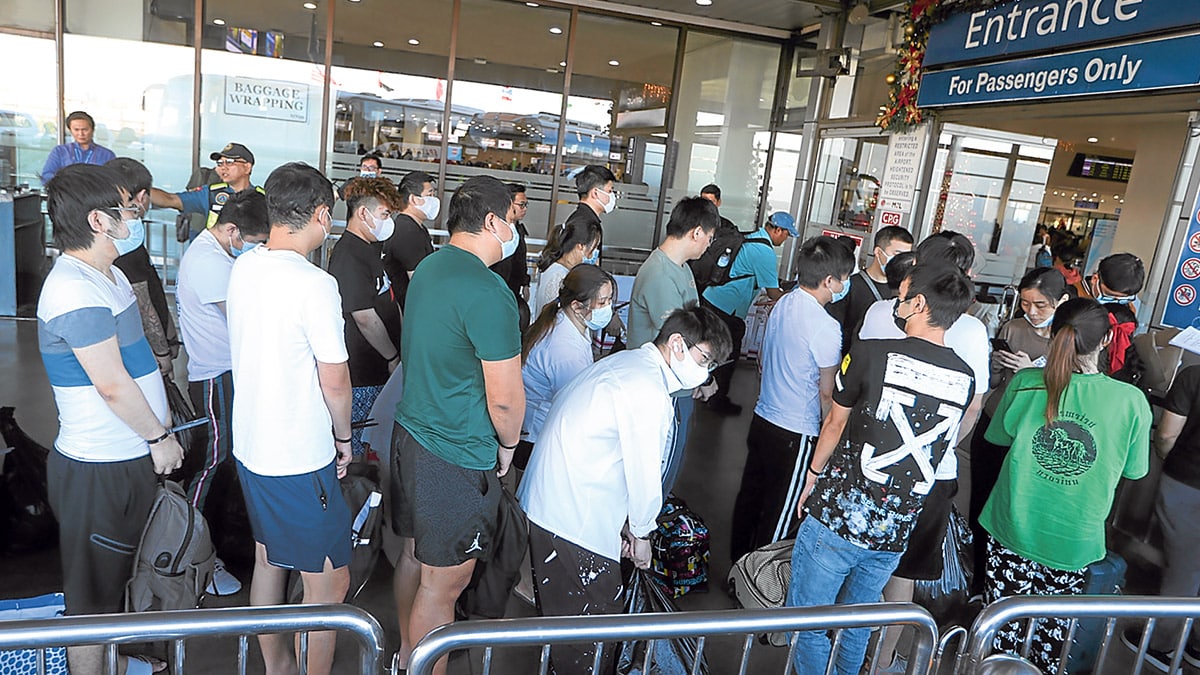
LEAVING PH Chinese workers arrested in a Philippine offshore gaming operator in Pasay City are shown in this Dec. 14, 2023 photo at Ninoy Aquino International Airport as they prepare to leave the country. —Niño Jesus Orbeta
MANILA, Philippines — The Bureau of Immigration (BI) on Monday said it expected around 20,000 former Philippine offshore gaming operator (Pogo) workers to leave the country in the coming weeks as the Dec. 31 deadline for the cessation of their operations approaches.
Immigration Commissioner Joel Anthony Viado emphasized the urgency of the situation, asking foreign Pogo workers to comply with the government-mandated deadline.
As of Nov. 7, Viado said that 21,757 foreigners linked to Pogo operations had voluntarily downgraded their work visas to temporary visitor visas and 10,821 of them had already left the country.
READ: Goodbye to Pogos: How will PH manage?
In October, the BI canceled the visas of 12,106 foreign nationals who did not apply for downgrades, and these individuals must exit the country before the year ends.
Viado warned that those who failed to leave by the deadline would face deportation and be blacklisted from entering the Philippines.
National problem
The BI chief previously told reporters that Pogos operating in the country had become a national issue, a problem that would become “bigger” after the Dec. 31 deadline set by President Marcos for all these gambling operations to cease.
“That’s why we are preparing, and other government agencies are also getting ready to do what is necessary to further implement this matter,” Viado said.
He said foreign Pogo workers were required to present outbound tickets when they applied for visa downgrades.
“By presenting that, they are committed to leaving by a certain date. We will not approve any downgrading if they do not present a ticket,” Viado said.
BI spokesperson Dana Sandoval clarified that the outbound ticket was a basic requirement for downgrading prearranged employment visas, or 9G visas, to tourist visas.
Workers must also provide documentation from their Pogo employers confirming the cessation of operations, along with a National Bureau of Investigation clearance.
“Essentially, what the bureau wants to see is that your engagement with the company has ended and that you intend to leave the country within a specific period,” Sandoval noted.
Final warning
Assistant Justice Secretary Jose Dominic Clavano IV also issued a stern warning last week: “By Dec. 31, it’s a blanket ban—no more licenses, no more business opportunities for Pogos in the Philippines.”
He added that the government would intensify operations against illegal Pogos that would attempt to continue operating after the deadline.
The President first announced the order to end Pogo operations during his State of the Nation Address (Sona) in July, citing their involvement in various crimes.
“Disguising as legitimate entities, their operations have ventured into illicit areas furthest from gaming, such as financial scamming, money laundering, prostitution, human trafficking, kidnapping, brutal torture, even murder,” Mr. Marcos had said.
In a formal directive dated Nov. 5, Executive Order (EO) No. 74 officially banned Pogo companies and stopped all applications or renewal of licenses, permits, and authorizations, citing national security and public order as the primary concerns.
The EO also ordered the creation of a Technical Working Group (TWG) on Anti-illegal Offshore Gaming Operations to further intensify the crackdown, as well as a TWG for Employment Recovery and Reintegration.
Monitoring
Presidential Anti-Organized Crime Commission chief Gilbert Cruz said last October that while many Pogos had already been closed, about a hundred were still being monitored.
“Many have also closed based on the report given by Pagcor (Philippine Amusement and Gaming Corp.), while others are continuously winding down their operations,” Cruz said in an interview over Radyo 630.
As of Nov. 18, there were still 27 out of 43 internet gaming licensees (the new name of Pogo) operating or in the process of winding down their operations. —with a report from Inquirer Research

